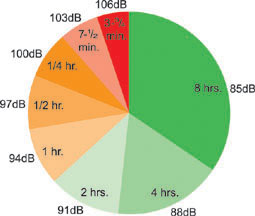This Is Our Ears Under Pressure
The hotness war that has led to increasingly loud commercial records (at the expense of sound quality) over the past decade ties in neatly with the question of noise-related hearing loss.
Although recording levels and output volume are nominally independent elements, it is fair to say that many people listen to music at SPLs that could safely be described as ‘loud’. This, of course, is part of the rock’n’roll ethos – but what are the effects of such high-volume listening behaviour in the longer term?

The ear is an extremely sophisticated system, and can be irreparably damaged by prolonged exposure to high sound pressure levels. The image above is taken from HEI and shows a close-up of damaged hair cells in the inner ear. Continuous noise above 85 dBA may be hazardous (140 dBA for transients). Of course, common listening levels on portable music devices would be somewhat above 85dBA. According to OSHA safety guidelines, the maximum allowable duration for listening at 85dB is eight hours. For each 3 dB increase above this level, listening time should halve.

Audiologist and drummer Andy Vermiglio recorded a drum session played using Hot Rods (a cross between sticks and brushes) and used a shoulder-mounted microphone to record the levels reaching his ears. Despite the fact that the drumming didn’t seem loud to his ears, the microphone picked up levels of 140 dBA (reported in the current edition of Mix Magazine).
Natural Hearing Loss – And How To Reduce It
The ears naturally lose a certain degree of sensitivity with age, and few adults can hear much above 15kHz. However, following the absorption of excessively loud music over a prolonged period, it is generally the 6-8 kHz range that first begins to diminish. For music professionals who rely on their ears to do their job, this can be disastrous.
In general, it is a good idea to attenuate signals (for listening purposes) whenever possible. Reducing the volume by even a couple of dB can be extremely beneficial, particularly if listening is extended over long periods of time. For mastering or mixing engineers, of course, it is a good idea to take regular breaks – ears do get tired, and many professionals report that they can hear much more detail in the morning.
For more information on hearing issues, check out the FAQ at Earbud.